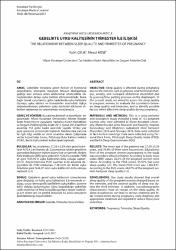Gebelikte uyku kalitesinin trimester ile ilişkisi
Özet
AMAÇ: Gebelikte meydana gelen fiziksel ve hormonal
değişiklikler, anksiyete, büyüyen fetusun diafragmaya
yaptığı bası sonucu artan abdominal rahatsızlıklar vb.
nedenlerden dolayı uyku kalitesi etkilenmektedir. Buna
bağlı olarak çalışmamız, gebe kadınlarda uyku kalitesini
ölçmeyi, uyku kalitesi ve trimesterler arasındaki ilişkiyi
değerlendirmeyi, gebelerin uyku kalitesini etkileyen etkenleri
saptamayı ve tanımlamayı amaçlamıştır.
GEREÇ VE YÖNTEM: Bu çalışma kesitsel ve tanımlayıcı bir
çalışmadır. Afyon Kocatepe Üniversitesi Ahmet Necdet
Sezer Araştırma ve Uygulama Hastanesi Kadın Hastalıkları
ve Doğum Polikliniğinde Aralık 2015-Şubat 2016 tarihleri
arasında 152 gebe kadın üzerinde yapıldı. Veriler yüz
yüze görüşme yöntemiyle toplandı. Katılımcılara çalışma
ile ilgili bilgi verildi ve sözlü onamları alındı. Çalışmada
veriler kişisel bilgi formu, Pittsburg Uyku Kalitesi İndeksi
(PUKİ), Berlin Uyku Anketi kullanılarak toplandı.
BULGULAR: Yaş ortalaması 27,59 ±5,59 olan gebe kadınların
%70,4 ü ev hanımı idi. Çalışmamıza katılan gebelerin
yarısından fazlasının eğitim düzeyi lise ve üzeredir. Beden
Kitle İndeksine (BKİ) göre gebelerin %20,4 ü obezdir. PUKİ
ye göre %55,92’in uyku kalitesinin kötü olduğu saptandı(˃5).
Araştırmamızda PUKİ puanları 0-20 arasında de-
ğişmekte idi. PUKİ ortalaması 7,38±4,91 dir. Berlin Uyku
Anketine göre %44,07 sinin uyku kalitesinin kötü olduğu
saptandı (≥2).
SONUÇ: Gebelerin genel uyku kalitesinin trimesterlere
göre değiştiği, en kötü uyku kalitesinin 3.trimesterde olduğu,
sosyo-demografik özelliklerin uyku kalitesi üzerine
etkili olduğu bulunmuştur. Uyku bozuklukları gebelikte
ciddi maternal ve fetal komplikasyonlara neden olabildi-
ği için erken tanı ve gerekli tedaviyle bu kötü sonuçların
azaltılabileceği düşünülebilir. OBJECTIVE: Sleep quality is affected during pregnancy
due to the reasons such as physical and hormonal changes,
anxiety, and increased abdominal discomfort due
to growing fetus putting pressure on the diaphragm. In
the present study, we aimed to assess the sleep quality
in pregnant women, to evaluate the correlation between
sleep quality and trimesters, and to identify possible
factors which affect the sleep quality during pregnancy.
MATERIALS AND METHODS: This is a cross-sectional
and descriptive study included a total of 152 pregnant
women who were admitted to Afyon Kocatepe University,
Ahmet Necdet Sezer Research and Training Hospital,
Gynecology and Obstetrics outpatient clinic between
December 2015 and February 2016. Data were collected
in face-to-face meetings. Data were collected using Personal
Data Form, Pittsburgh Sleep Quality Index (PSQI),
and Berlin Sleep Questionnaire (BSQ).
RESULTS: The mean age of the patients was 27,59 ±5,59
years, and 70,4% of them were housewives. Educational
level of the pregnant women participating in the study
was secondary school or higher. According to body mass
index (BMI) values, 20,4% of the pregnant women were
obese. According to the PSQI scores, 55,92% had poor
sleep quality (˃5). The mean PSQI score was 7,38±4,91.
According to the BSQ scores, 44,07% of the pregnant women
had poor sleep quality (˃2).
CONCLUSIONS: Our study results showed that overall
sleep quality of the pregnant women changed based on
the trimester, and the poorest quality of sleep was during
the third trimester. In addition, sociodemographic
characteristics have an impact on the sleep quality. As
sleep disturbances can lead to serious maternal and fetal
complications during pregnancy, early diagnosis and
appropriate treatment are required to reduce these poor
outcomes.
Kaynak
Afyon Kocatepe Üniversitesi, Kocatepe Tıp DergisiCilt
18Sayı
3Bağlantı
http://kocatepetipdergisi.aku.edu.tr/wp-content/uploads/2017/08/1.33-16-A-Fatih-C%CC%A7ELI%CC%87K.pdfhttp://hdl.handle.net/11630/4702
Koleksiyonlar
- Makaleler [452]
- TR-Dizin İndeksli Yayınlar Koleksiyonu [241]



















